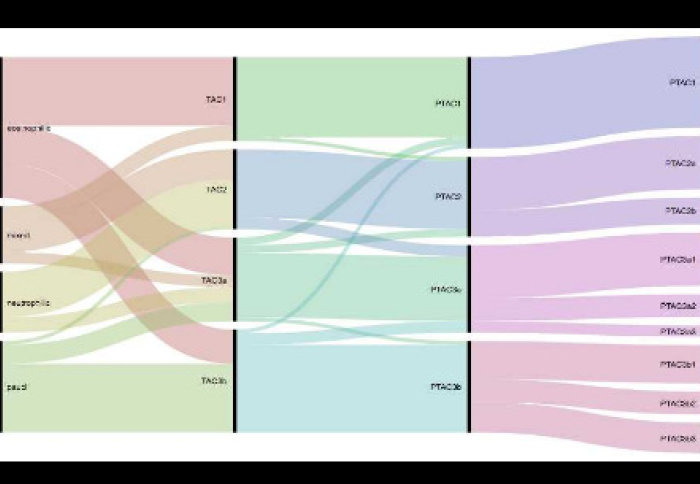Using Big Data to unravel asthma
by Fay Miller

Asthma Groupings
Asthma is not a single disease but actually a complex of different conditions with fundamentally different underlying molecular machinery
Asthma is not a single disease but actually a complex of different conditions with fundamentally different underlying molecular machinery, according to research carried out at Imperial.
These findings were recently presented by Dr Nazanin Kermani of Imperial’s Data Science Institute (DSI) at the European Respiratory Society’s International Congress in Paris. Using computationally intensive machine learning over protein and gene expression data obtained from asthmatics, she and colleagues at DSI and the National Heart & Lung Institute (NHLI) were able to identify the signature of different types of asthma within the patients. Further, they were able to show that while each type showed a range of overlapping symptoms, these were invoked by distinctly different genes and pathways. This picture of asthma as a set of different disease explains why asthmatics can have such a range of responses to different drugs and therapies, pointing the way towards improved treatment that targets the specific type rather than one-fits-all treatment.
“There have been several previous attempts to subtype asthma,” said Dr Paul Agapow (DSI), a co-author on the study. “By using molecular data, we get a more objective view of the disease that might be obscured by similar-looking symptoms. By using a variety of different but complementary machine learning approaches and validating our results with external datasets, we have a clearer and more robust picture of what is driving asthma.”
"Data is being produced at a relentless velocity and volume. Understanding and using this data could revolutionise scientific discovery.” Professor Yike Guo Director of the Data Science Institute
This is just the latest product of Imperial participation in the U-BIOPRED (Unbiased Biomarkers for the Prediction of Respiratory Disease Outcomes) project, which was supported by Europe’s Innovative Medicines Initiative. Involving 20 academic institutions, 11 biopharma industry partners and 6 patient organisations across 11 European countries, it aimed to understand more about severe asthma, how it varied from person to person and how treatment could be improved. Running from 2010 to 2014, it still continues to generate results, including more than 36 publications, from a huge database of data gathered from asthma patients, including molecular, clinical and demographic data.
The analysis within U-BIOPRED leaned heavily upon tools and approaches developed at DSI as part of its program in biomedical and translational informatics, which studies how to build, manage and analyse complex biomedical data.
Article text (excluding photos or graphics) © Imperial College London.
Photos and graphics subject to third party copyright used with permission or © Imperial College London.
Reporter
Fay Miller
Faculty of Engineering